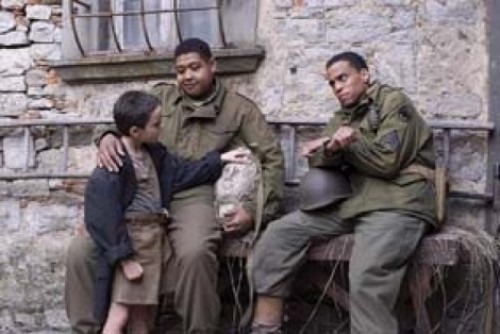Cinema | G.I. D’oh!: Spike Lee turns Miracle at St. Anna into a war story with no focus, and no point.
By MaryAnn JohansonIf there’s a miracle to Miracle at St. Anna, it’s a rude one: It may well be that here we have a film obviously crafted with deep earnestness and profound love and serious talent—and it fails entirely, on every level, in every way that a movie can fail. It’s as if supernatural intervention were required so that no smidgen of that indefinable movie magic could be generated. We come to the end—after a long slog of 160 minutes—and we find ourselves saying, “Yes, and … ?” with no answer forthcoming. Could be this is the longest and most expensive shaggy-dog story ever told?
It pains me to say that. There are moments of undeniable power here, in what is, for the most part, a tale of black American GIs in Italy in 1944. They suffer abuse even at the hands of their white commanders, while receiving warm acceptance from their accidental hosts, the people of a small village (not St. Anna: another village entirely), and attempt to carry out a mission under impossible conditions. Derek Luke breaks your heart as the staff sergeant nominally in charge of this plucky little band of survivors of a terrible battle. He’s one of the finest young actors working today—or not working enough today, as the case may be, with so few truly meaty roles for young black men. Michael Ealy, as the A-hole of the band of soldiers, gives an astonishingly uncompromising performance as a man who is really hard to like, yet Ealy demands that you don’t dismiss the character anyway.
But Miracle is like a novel, without the novel—which could be a result of the fact that novelist James McBride, adapting his own book, had never written a screenplay before this one. It’s a “lyrical” movie without the lyricism; I wouldn’t have thought that Spike Lee could be flummoxed as a director, but that’s what seems to have happened here. McBride and Lee take us off on all sorts of irrelevant tangents, dropping us into the middle of other stories and other characters—sometimes never coming back to them, and sometimes suddenly focusing on them with a fervor that defies our expectations, though not in a good way. The lack of perspective, of a cohesive, direct point of view is frustrating; the getting us caught up in one moment and then abandoning it entirely is unforgivable. Maybe the novel was a beautifully written piece of prose about the tenuous and seemingly disconnected connections between people, about how human life flows into human life, about how people intersect in unexpected and amazing ways. If Miracle hoped to capture that, it did not succeed in any way.
Instead, we end up with no sense of what the story is or where it may be going, and it’s not interesting enough along the way to make us care about just being in the moment. Miracle at St. Anna lacks all impetus, all energy, all soul. It plays like a collection of Oscar clips, diffuse moments of beauty and strength unconnected to the sea of too many characters and the pointless scenes they’re lost in. We don’t know where to focus, and we don’t know where to look. This is like three or four movies jammed inexpertly together. I never understood why I was being told any of this, and I never understood the point.
One thing Miracle at St. Anna excels at? It’s an excellent illustration of the vital difference between story (i.e., what happens) and plot (i.e., how a movie reveals to us what happens). There’s a great movie to be made from this story, probably, but this isn’t it.
MIRACLE AT ST. ANNA
Derek Luke, Michael Ealy, Omar Benson Miller
Rated R
More by MaryAnn Johanson
-
Feature movie review: Society of the Snow
A new adaptation finds new power in a 50-year-old event.
- Jan 3, 2024
-
Film Reviews: New Releases for Dec. 8
The Boy and the Heron, Maestro, Eileen, Leave the World Behind
- Dec 7, 2023
-
Feature movie review: MAESTRO
Bradley Cooper's Leonard Bernstein biopic avoids cliché and offers electrifying audacity
- Dec 6, 2023
- More »
Latest in Film Reviews
Readers also liked…
-
Power Plays
Two satirical comedies explore manipulations and self-delusions by those with power.
- Aug 31, 2022




